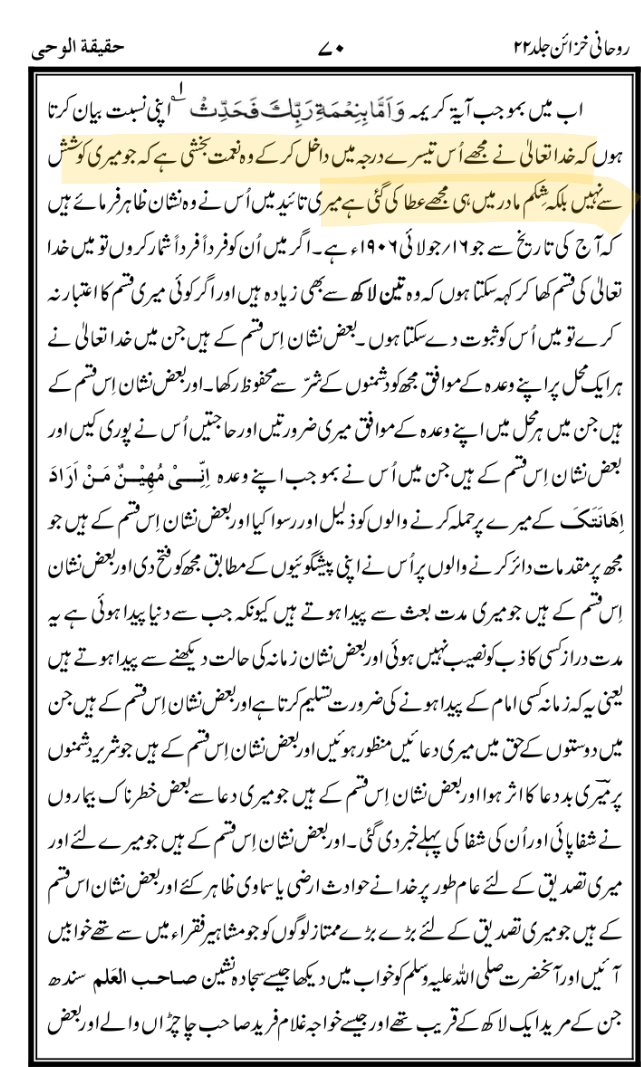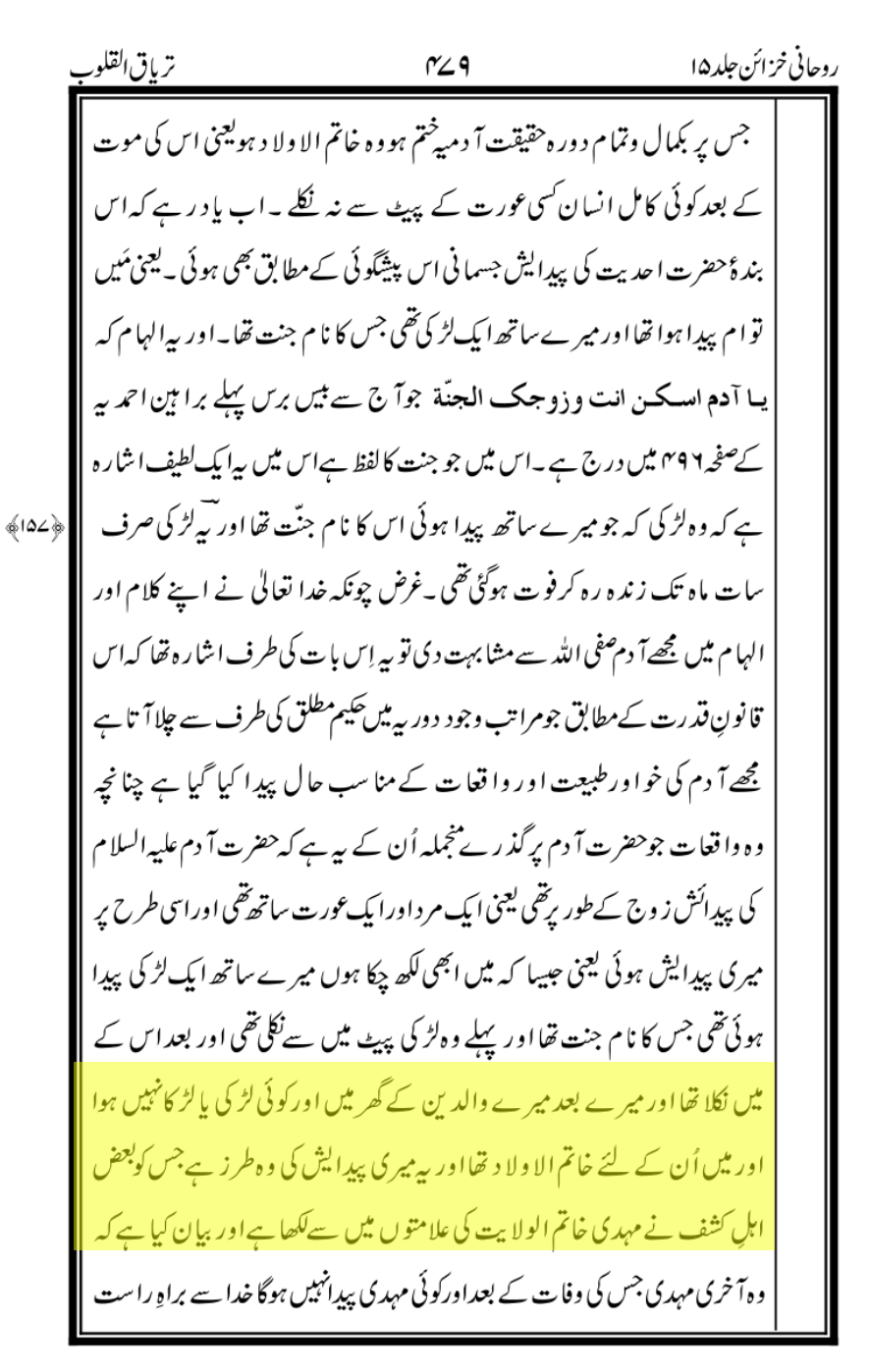Qadiani Objection 1:
No one can prove that the word ‘Khatam’ (خاتَم) when attributed to a plural (جمع) means ‘the last.’ This challenge has been given for 100 years, but no one has refuted it.
Answer:
Mirza Ghulam Ahmad himself used the phrase “Khatam al-Khulafa” (خاتم الخلفاء) in Chashma-e-Ma’rifat (Ruhani Khazain, Vol. 23, p. 333) and translated it as “the last Khalifa.”

- Here, “Khatam” is attributed to “Khulafa” (a plural word).
- This proves that “Khatam” can mean “the last” even when referring to a group.
Qadiani Objection 2:
“We don’t rely on Mirza Ghulam Ahmad’s writings; we rely on Arabic dictionaries and Arab usage. Don’t present Mirza’s writings to us.”
Answer:
Fine. Let’s examine classical Arabic dictionaries:
- Taj al-Arus (تاج العروس):
- “والخاتم آخر القوم کالخاتم ومنه قوله تعالی خاتم النبیین أی آخرھم”
- “Khatam” means the last of a group, as in Allah’s verse: ‘Khatam an-Nabiyyin’ (the last of the prophets).” (Taj al-Arus, Vol. 32, p. 45)
- “والخاتم آخر القوم کالخاتم ومنه قوله تعالی خاتم النبیین أی آخرھم”
- Lisan al-Arab (لسان العرب):
- “وختام القوم وخاتَمھم وخاتِمھم آخرھم”
- “Khatam al-Qawm” means “the last of the people.” (Lisan al-Arab, Vol. 12, p. 162)
- “وختام القوم وخاتَمھم وخاتِمھم آخرھم”
- Kulliyat Abi al-Baqa (کلیات ابی البقاء):
- “وتسمیة نبینا خاتم الانبیاء لآن الخاتم آخر القوم”
- “Our Prophet (ﷺ) is called ‘Khatam al-Anbiya’ because ‘Khatam’ means the last of a group.” (Kulliyat Abi al-Baqa, p. 431)
- “وتسمیة نبینا خاتم الانبیاء لآن الخاتم آخر القوم”
Conclusion: “Khatam an-Nabiyyin” linguistically means “the last of the prophets.”
Qadiani Objection 3:
“You showed ‘Khatam al-Qawm,’ but ‘Qawm’ is singular, not plural. Its plural is ‘Aqwam.'”
Answer:
“Qawm” is a collective noun (اسم جمع), meaning a group of people.
- In the Quran, “Qawm” is always followed by plural pronouns:
- “یَا قَوْمِ اعْبُدُوا اللَّهَ مَا لَكُم مِّنْ إِلَٰهٍ غَيْرُهُ”(Surah Al-A’raf 7:59)
- “O my people (Qawm), worship Allah… (using plural verbs: اعبدوا, لكم)”
- “فَلَبِثَ فِيهِمْ أَلْفَ سَنَةٍ”(Surah Al-Ankabut 29:14)
- “He remained among them (فيهم) for 950 years.”
- “یَا قَوْمِ اعْبُدُوا اللَّهَ مَا لَكُم مِّنْ إِلَٰهٍ غَيْرُهُ”(Surah Al-A’raf 7:59)
Thus, “Qawm” is treated as a plural noun in Arabic grammar.
Qadiani Objection 4:
“In Arabic usage, titles like ‘Khatam al-Muhaddithin’ (خاتم المحدثین) or ‘Khatam al-Fuqaha’ (خاتم الفقہاء) are given to scholars. Does this mean no scholars came after them?”
Answer:
- When humans use titles like “Khatam al-Muhaddithin,” they do not claim absolute finality (since humans are not omniscient).
- But when Allah says “Khatam an-Nabiyyin,” it means absolute finality because Allah knows the unseen.
- Example:
- If a king declares someone as “the last governor,” it means no more governors will be appointed.
- But if a common person says, “He is the last scholar,” it is just praise, not a divine decree.
Qadiani Objection 5:
“Mirza Ghulam Ahmad used ‘Khatim al-Awlad’ (خاتِم الاولاد) to mean ‘the last child,’ but ‘Khatam’ and ‘Khatim’ are different.”
Answer:
This is a false distinction. Classical Arabic scholars confirm:
- “الخَتُمُ، الخَاتِمُ، الخَاتَمُ، والخَيْتَامُ كُلَّها بِمَعْنًى وَاحِدٍ وَ مَعْنَاهَا آخِرُهَا”(Lisan al-Arab, Vol. 12, p. 164)
- “Khatam, Khatim, Khaytam—all mean ‘the last.'”
- “خِتَامُ القوم خاتِمُهُمْ و خاتَمُهُم آخِرُهُمْ”(Tahdhib al-Lugha, Vol. 7, p. 316)
- “Khatam al-Qawm and Khatim al-Qawm both mean ‘the last of the people.'”
Thus, “Khatam” and “Khatim” are synonymous in meaning “the last.”
There are several reasons why the Qadiani translation of “Khatam al-Nabiyyin” is incorrect:
Reason 1
“I received prophethood while still in my mother’s womb.”
Haqeeqat-ul-Wahi, Volume 22, Page 70

On one hand, it is said that prophethood is obtained by following the Prophet ﷺ, but here Mirza Sahib claims that he received prophethood while still in his mother’s womb. Now, the readers can decide for themselves which of Mirza Sahib’s statements is correct.
Reason 2
“After my birth, no other boy or girl was born to my parents. Thus, I was the Khatam al-Aulad (last of the children) for my parents.”
Ruhani Khaza’in, Volume 15, Page 479

After Mirza Sahib, there was no prophethood but only a caliphate. Therefore, the Prophet ﷺ was Khatam al-Nabiyyin (the last of the prophets), not Khatam al-Nabiyyin in the Qadiani sense. Hence, this translation is also false in the eyes of the Qadianis.
Reason 3
If “Khatam al-Nabiyyin” means that prophethood is obtained by following the Prophet ﷺ, then this would mean that the Prophet ﷺ is not the last of the prophets from Adam (peace be upon him) to Jesus (peace be upon him), but rather the last of the prophets to come after him. This contradicts the clear understanding of the Qur’an and Hadith.
Reason 4
This translation contradicts the Arabic idioms because if “Khatam al-Nabiyyin” meant that prophethood comes from following the Prophet ﷺ, then “Khatam al-Qaum” and “Khatam al-Muhajireen” would have to mean that their stamp or seal forms the nations or the Muhajirs. Even Qadianis would not accept this interpretation.
If “Khatam al-Nabiyyin” means that one becomes a prophet by following the Prophet ﷺ, then “Khatam al-Aulad” would have to mean that Mirza Sahib’s seal would create children in his parents’ household. Would Qadianis accept this interpretation of “Khatam al-Aulad”?
Certainly, they will not accept this, proving that the Qadiani translation of “Khatam al-Nabiyyin” is entirely false.
Final Conclusion: Why Qadiani Interpretations Are Wrong
- Linguistically, “Khatam an-Nabiyyin” means “the last of the prophets.”
- Quran & Hadith confirm:
- “لَا نَبِيَّ بَعْدِي” (No prophet after me – Sahih Bukhari 3535)
- “خَاتَمَ النَّبِيِّينَ” (Seal of the Prophets – Quran 33:40)
- Mirza Ghulam Ahmad contradicted himself:
- First, he believed in the return of Jesus (علیہ السلام).
- Later, he claimed to be the Messiah, violating “Khatam an-Nabiyyin.”
- Arabic grammar & dictionaries prove “Khatam” means finality.